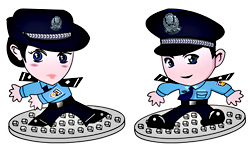No one would mistake the current Chinese regime for Teletubbies, unless you listen to their propaganda. The Chinese have a bizarre style that includes both sweeping public pronouncements and baby talk.
Sure, there are cultural differences between China and the West, but it’s easy to recognize that they’ve figured out a new way to promote totalitarianism: Hello Kitty meets Big Brother.
This is suggested by their well-known diplomatic efforts that have long included loaning host countries cuddly-looking giant pandas with names like Yang Yang and Lun Lun. The double syllables, the Chinese say, are a traditional way of expressing affection for young ones.
The Chinese have also ramped up the cutesy factor with their selection of not one, not two, but five mascots for the 2008 Olympic games in Beijing. They are cartoon figures called Beibei, Jingjing, Huanhuan, Yingying, and Nini. They represent a fish, panda, Tibetan antelope, swallow, and Olympic flame. Called “Friendlies,” they exhibit a spunky zest that reassures people that things are different in China these days. It’s spunky zest that will conquer the world, not a massive military buildup. Hey, Tibet, turn that frown upside down!
The best example of the new faces of the police state are Jingjing (not to be confused with the Olympics’ Jingjing) and Chacha, two animated police officers that pop up on Chinese computers. When you combine their names—Jingcha—it spells “police.” Introduced in the booming southern Chinese city of Shenzhen, the two cartoon cop icons float around on computer screens to remind Internet users that they are being monitored by the Shenzhen Public Security Bureau’s Internet Surveillance Center. The icons are there to make people think twice before posting messages or visiting any Web sites that might be questionable, illegal, or subversive. Not only are the Chinese working with Google, Microsoft, and Yahoo to censor the Internet, they’ve got virtual cybercops as backup intimidators.
Computer users can also click on the Jingjing and Chacha icons to report crimes—a handy way to inform on your fellow netizens. Chen Minli, director of the surveillance center, told the Financial Times, “All around the world there are Internet police, but they always operate backstage. . . . No other Internet police have stepped to the front of the stage. We really feel that this is a historic breakthrough.” If only the National Security Agency were so thoughtful.
Despite the Chinese claim of innovation, they are not the first to use cartoon characters to maintain domination of a people, and I’m not talking about Disney.
I imagine that when Chinese President Hu Jintao was in Seattle this week nibbling prawns at Bill Gates’ lakefront compound (see Buzz), he and his entourage might have been introduced to two retired Microsofties who were way ahead of their time: Clippy and Microsoft Bob.
Clippy was the ever-present, almost- impossible-to-turn-off animation in Windows who watched what you did and popped in with unhelpful suggestions at inopportune times. His reign of terror lasted from the late 1990s to just after the turn of the century. I’m sure many people upgraded to the new version of Office just to be rid of ol’ Clippy.
And then there was Microsoft Bob, the bespectacled smiley face whose career was once managed by Gates’ wife, Melinda. He was supposed to be the “user friendly” interface for Windows, luring reluctant late-adopters by putting a sunny visage on software’s evil empire.
Many people believe the federal antitrust case against Microsoft was a misapplication of justice. Instead of being slammed for its monopolistic practices, it should have been tried for cruel and unusual punishment for inflicting Clippy and Bob on the world. Of course, America might have been fooled if Microsoft had been smart enough to adopt the Chinese technique of naming them Bo Bo and Clip Clip.
Like a lot of other things, it looks like America may have innovated an idea, but it took the Chinese to really make it work on a large scale. One hopes, however, they keep their new sinister, plush-toy Big Brother–ism to themselves.
As the Chinese diplomatic juggernaut leaves Seattle for the nation’s capital, its carry-on bags bulging with new software and Boeing jets, one shudders to think what might happen if Karl Rove picks up any ideas from Hu and company. With George W. Bush’s popularity at an all-time low, we might end up with a new White House spokescharacter: a lovable, bespectacled panda named “Dick-Dick” telling us that candy and garlands await us in Iran after we drop a nuke-nuke there.
A little bit of sugar does make the medicine go down.







